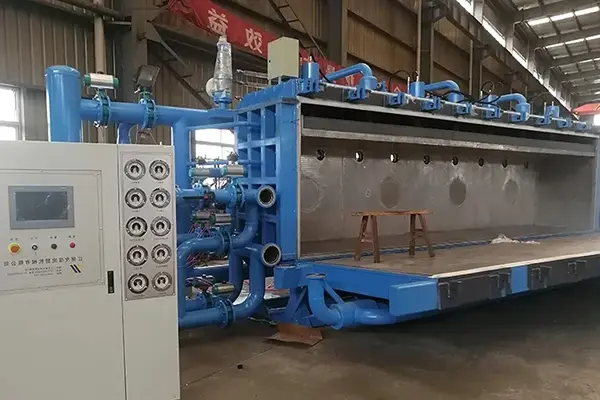Expanded Polystyrene (EPS) molding machines are integral to the manufacturing of EPS products, widely used in packaging, insulation, and construction industries. As the global market increasingly demands lightweight, cost-effective, and environmentally friendly materials, EPS products have become more prevalent, and with them, the need for advanced EPS molding machines has grown. This article explores the development prospects of EPS molding machines, considering market trends, technological advancements, and the broader impact of environmental concerns on the industry.
Growing Demand for EPS Products
EPS products have a broad range of applications, from packaging materials used for protecting electronics, furniture, and appliances during transportation, to insulation panels in construction that enhance energy efficiency in buildings. The lightweight nature of EPS, combined with its excellent shock-absorbing and insulating properties, makes it a preferred material in multiple industries.
As global economies continue to expand, particularly in developing countries, the demand for these products is expected to grow. For instance, the construction industry in emerging markets is experiencing rapid growth, driving the need for insulation materials. Similarly, e-commerce and logistics sectors are booming, leading to increased demand for protective packaging solutions. These market dynamics are creating significant opportunities for EPS molding machine manufacturers to innovate and expand.
Technological Advancements in EPS Molding Machines
Technological advancements are one of the primary drivers of the EPS molding machine market’s development. Manufacturers are investing in research and development to create more efficient, energy-saving, and versatile machines. Several technological trends are influencing the evolution of EPS molding machines:
- Automation and Smart Manufacturing: The integration of automation and Industry 4.0 technologies into EPS molding machines is transforming the industry. Machines are becoming smarter and more capable of performing tasks with minimal human intervention. Advanced control systems enable precise temperature regulation, steam distribution, and molding cycles, improving production efficiency and product quality. Automated systems also allow for better tracking and data analysis, helping manufacturers optimize operations and reduce waste.
- Energy Efficiency: Energy consumption is a significant concern in EPS production due to the high-temperature processes involved. To address this, manufacturers are developing machines with improved energy efficiency. These machines incorporate features like optimized steam management, energy recovery systems, and more efficient heating elements, reducing the overall energy consumption of the molding process. This not only lowers operational costs but also aligns with growing environmental regulations and sustainability goals.
- Customization and Flexibility: As industries diversify their use of EPS products, there is increasing demand for custom designs and shapes. Modern EPS molding machines are becoming more flexible, allowing for the production of highly customized products. Machines now offer adjustable mold designs, faster changeovers, and multi-functional capabilities, enabling manufacturers to meet the specific needs of various sectors.
- Sustainability and Recycling: With global attention to environmental sustainability, there is growing pressure to reduce plastic waste. While EPS is recyclable, it is often misunderstood as an environmentally harmful material. As a result, the development of EPS recycling technologies and machines capable of producing EPS products with recycled content is gaining traction. Some manufacturers are already offering EPS molding machines designed to work with recycled EPS materials, promoting a circular economy approach in the industry.
Environmental Regulations and Sustainability Trends
The EPS industry faces increasing scrutiny due to environmental concerns related to plastic waste and non-biodegradable materials. While EPS has been criticized for its environmental impact, advancements in recycling technology and manufacturing processes are changing the narrative. EPS is 100% recyclable, and modern recycling methods are being developed to collect, process, and reuse EPS waste in new products.
EPS molding machine manufacturers are responding to these environmental challenges by developing eco-friendly solutions. Machines are being designed to minimize material waste during the production process, and advanced molding techniques allow for the production of thinner, lighter EPS products without sacrificing strength or durability. Furthermore, as more companies adopt circular economy models, EPS molding machines that can utilize recycled materials will become increasingly important.
Additionally, governments in various regions are implementing stricter regulations on plastic usage and waste management. For example, the European Union’s Green Deal and Circular Economy Action Plan aim to reduce plastic waste and promote sustainable practices in industries. As a result, EPS molding machine manufacturers must align with these regulatory trends by producing energy-efficient machines that support sustainable EPS production.
Market Opportunities and Challenges
The development of EPS molding machines presents numerous market opportunities, but it is not without challenges. On the one hand, the increasing demand for EPS products, driven by growth in the packaging, construction, and insulation sectors, creates a strong market for molding machine manufacturers. The push for automation, energy efficiency, and sustainability also opens up opportunities for innovation and differentiation in a competitive market.
On the other hand, the industry faces challenges related to environmental perceptions and regulatory compliance. Public concerns about plastic waste may impact the adoption of EPS products, particularly in regions with stringent environmental policies. Manufacturers must continue to invest in sustainable solutions and educate stakeholders on the recyclability of EPS to overcome these challenges.
Conclusion
The development prospect of EPS molding machines is promising, driven by the increasing demand for EPS products in various industries, technological advancements in automation and energy efficiency, and a growing focus on sustainability. As manufacturers continue to innovate and adapt to market trends, the EPS molding machine industry is poised for significant growth. However, challenges related to environmental concerns and regulations must be addressed through continued investment in sustainable solutions, ensuring that EPS remains a valuable and eco-friendly material for the future.
Post time: 09-21-2024






